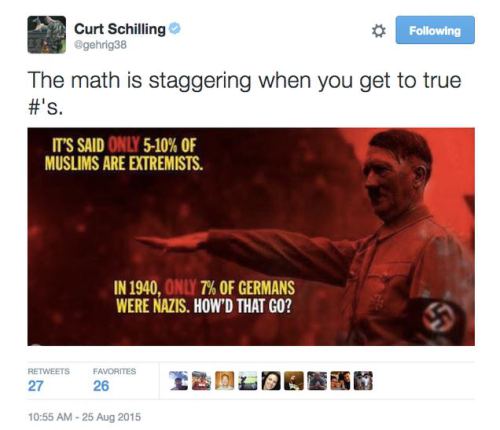ESPN pulled former baseball pitching star Curt Schilling from its Little League broadcast team yesterday after becoming aware of his tweet above, saying in a statement:
“Curt’s tweet was completely unacceptable, and in no way represents our company’s perspective. We made that point very strongly to Curt and have removed him from his current Little League assignment pending further consideration.”
Schilling then tweeted this apology: “I understand and accept my suspension. 100% my fault. Bad choices have bad consequences and this was a bad decision in every way on my part.” This appears to be a #1 on the Ethics Alarms Apology Scale...“An apology motivated by the realization that one’s past conduct was unjust, unfair, and wrong, constituting an unequivocal admission of wrongdoing as well as regret, remorse and contrition, as part of a sincere effort to make amends and seek forgiveness.”
If I had delivered it, however, it might have been a #7: “A forced or compelled version of 1-4, in which the individual (or organization) apologizing may not sincerely believe that an apology is appropriate, but chooses to show the victim or victims of the act inspiring it that the individual responsible is humbling himself and being forced to admit wrongdoing by the society, the culture, legal authority, or an organization or group that the individual’s actions reflect upon or represent.”
What was it exactly that Schilling’s tweet showed, implied, suggested or stated that was” completely unacceptable, in no way represent ESPN’s perspective, and that justified his employer’s action? Curt Schilling is an inquisitive, politically active and opinionated man, and has always annoyed sportswriters because 1) he’s openly conservative 2) he’s a devout Christian, and isn’t shy about talking about it, 3) he can write and speak coherently and was capable, while playing, of challenging their criticism, and 4) he’s a lot smarter than most of them. I am assuming in this inquiry that nothing in Schilling’s contract or agreement with ESPN restricted his right to express non-sports opinions on his own time.
Here are some possibilities: Continue reading
